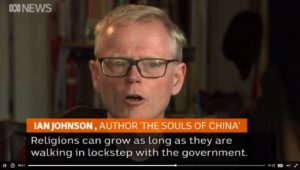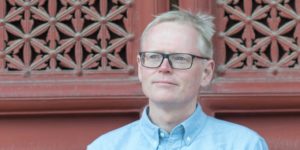 |
| Ian Johnson |
The less-than straightforward relation between China's communist rulers and religion is one of the complicated concepts
author Ian Johnson of
The Souls of China: The Return of Religion After Mao tries to explain. From repression, to tolerance and now moving to a idea to use religion to restore some order, that relationship has changed profoundly,
he tells The Politic, although it varies depending on what religion you look at.
The Politic:
President Xi Jinping´s administration has embraced different traditions, including religious ones, that serve his party. Can you talk a little bit about this, what has he done, and why is it important now that he has been re-appointed for another five-year term?
After he took power in 2012, he very quickly made a series of highly symbolic visits. He visited the hometown of Confucius in Qufu, and he prayed to Confucius. He made another visit to UNESCO in Paris and praised Buddhist tradition, and he also had public meetings with Buddhist leaders. So then, they began to push this propaganda campaign of the China dream—this is Xi Jinping’s signature slogan—and this dream is a national rejuvenation, but it’s also social justice, and they use traditional images and traditional ideas and concepts to promote that.
That was the beginning of the efforts. This is one of the reasons he is very popular, and it’s probably because they feel that society went out of control. His campaign against corruption is very popular, [the thinking is], “Yes, we need to stop corruption, but we also we need some kind of frame to get society in order.”
If you think about it broadly, you got the Mao Era, and the Reform Era, and then the government backed away from the control of society, and they let people do what they wanted to do as long as they didn’t challenge the government. By the 2000s, people thought that things had gotten out of control. The internet was coming up, [new] NGOs were forming, and they didn’t want the Party to be challenged. So, starting before Xi Jinping, but especially after he took power, there’s been this effort to reassert control over society. I think they see religion as a useful tool in the overall effort to restore some sort of order in society.
From what I understand, in the 19th century, religion and politics were very intertwined. And now, apparently, it is becoming intertwined again, so how are people receiving these changes? And what are the implications of this?
Well, I don’t think they can go all the way back. In the old system, the emperor was a quasi-deity, the son of heaven.
One implication is that there are other religions in China besides the ones the government is happy to support. The government is comfortable with Buddhism, Daoism, these so-called traditional religions, but it is less comfortable with Christianity and Islam, which also have significant populations. I think this could be a source of tension in the future. Already there are quite Islamophobic bloggers who write against Islam and question whether Islam is part of China. Actually, Islam has been in China for over a thousand years, so it’s not like it arrived last year. And about half of the Christians of China are not part of the official church, they are part of unregistered churches. I think they want to make them register with the government, those roughly thirty million Christians, and that’s going to be difficult, it can cause a lot of tensions.
Why do they oppose Christianity and Islam?
I think they don’t oppose it per se. I think what they don’t like is the foreign influence, foreign ties. It is the same with NGOs. NGOs in China can form, but they can’t take foreign money. So, with Christianity and Islam, you have inherent foreign ties. In Catholicism, bishops must be appointed by the Vatican, and in Protestantism, you also have ties with global, Evangelical movements. They send, not missionaries, but trainers, especially Chinese-Americans who come with a tourist visa and then teach and train pastors. Then, Islam also has a really strong global component, for example with the pilgrimage to Mecca. Some countries also want to donate money to build mosques, and the government is always trying to limit that.
More in The Politic.
Ian Johnson is a speaker at the China Speakers Bureau. Do you need him at your meeting or conference? Do get in touch or fill in our speakers' request form.
Are you looking for more strategic experts at the China Speakers Bureau? Do check out this list.











